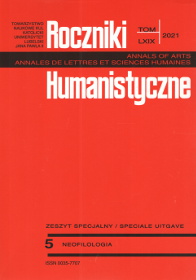„Franz heiße ich auch, da scheint die Kanaille nicht weit; im Augenblick überzeugt es fast mich selbst“. Ein unerkannter Fall von Traditionsverhalten in der Literatur der klassischen Moderne: Schillers Räuber (1781) in Kafkas Urteil (1912)
“Thus, My Name is Franz, which Readily Evokes a Scoundrel; at the Moment it Almost Strikes Even Me that Way”. An Unknown Reference to Tradition in Classical Modernism: Schiller’s The Robbers (1781) and Kafka’s The Trial (1912)
Author(s): Thomas PittrofSubject(s): Language and Literature Studies, Studies of Literature, German Literature
Published by: Towarzystwo Naukowe KUL & Katolicki Uniwersytet Lubelski Jana Pawła II
Keywords: Kafka’s intertextual practices; Schiller’s The Robbers; Kafka’s The Trial; Jochen Schmidt
Summary/Abstract: In the summer of 2020, Jochen Schmidt (born 1938), one of the most prominent Germans in the field of German studies, passed away. He became famous thanks to his studies on the works of Hölderlin, Kleist, Goethe and Musil. His two-volume work The History of Genius Thought (Geschichte des Genie-Gedankens) was reissued many times and became the inspiration for a comprehensive commentary on Nietzsche’s collected works. Until now, it has generally been overlooked that his last book, which deals with the cult of Nietzsche and his work The Will to Power (Wille zur Macht), also contains a chapter dedicated to Kafka (Schmidt 2016, 95-100). In this, Schmidt reveals the traces of The Will to Power in the story The Trial (Das Urteil). In his analysis of the struggle between the father and the son, however, he does not provide a very convincing interpretation of the father figure as a figuration which fulfils its ‘pre-extentialist’ and superior function in relation to Georg Bendemann. This article refers to older studies on Kafka’s work, yet also opens up a completely new perspective. For the first time ever, Schiller’s drama The Robbers (Die Räuber) is treated here as pre-text for Kafka’s story, and its meaning is interpreted as a coherent representation of the internal simulation of the process of emancipation.
Journal: Roczniki Humanistyczne
- Issue Year: 69/2021
- Issue No: 5
- Page Range: 47-63
- Page Count: 17
- Language: German

